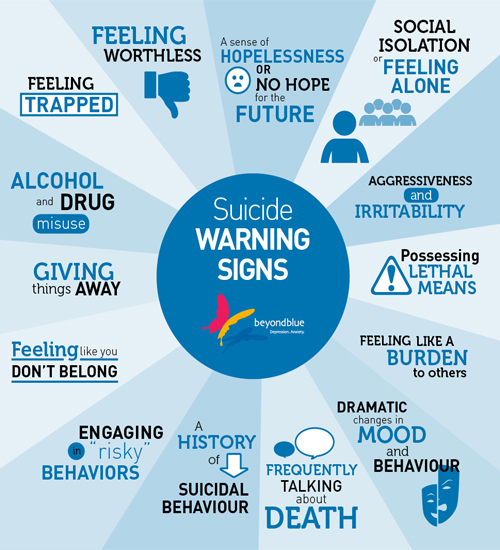Supporting someone else through crisis

There is no one way to prevent suicide, but there are many ways we can offer care and support to someone who is suicidal.
On this page:
- Warning signs
- What to say
- What to do
- Community care
Warning signs
Sometimes people keep their thoughts and feelings of suicide to themselves, and we might think everything is okay for them. It’s important to remember we’re not responsible for other people’s decisions.
However, we can make time to have regular check-ins with our friends, colleagues and loved ones so that subtler warning signs may be easier to notice or understand.
Explore each other’s needs or coping strategies and affirm feelings and experiences by listening and showing empathy.
Some warning signs of suicidal thoughts, feelings or intent include the following:

What to say
These pages provide conversation guides for talking about suicide:
What to do
Let the person you’re supporting guide your actions. Seek consent whenever possible.
These conversations should be guided by what will keep both people safe. If you are feeling overwhelmed by the situation, you can suggest directing the person to someone you both know or a support service. It can help to familiarise yourself with the services available.
There are peer workers who are trained to have these difficult conversations and have their own lived experience of suicide. You can find peer workers here.
If someone has put themselves in danger and are at risk of serious injury or death, reach out for immediate support by calling 000.
Community care
The LGBTQ+ community has a long history of supporting each other. We do this by sharing resources and through activism.
It’s not our identities as LGBTQ+ people that make suicide statistics in our communities higher than in the general population. It’s how these identities are treated, policed and legislated that can impact our mental health.
Therefore, it’s important to recognise what systems and external factors might be causing harm or creating barriers to receiving proper care.
When supporting someone experiencing suicidal thoughts and feelings, we don’t have to do it alone. Coming together to support someone as a team will show them that they are cared for and allow them to reach out to different people for support.
A community of care can look like a couple of close friends and/or family members (chosen or relatives), a friendship group, people in the person’s neighbourhood, the professionals the person sees for their health, or other LGBTQ+ people and allies. It can help to write down exactly who these people are so that in hard times there’s a reminder of who else can support the person, and even yourself.
It’s important that you take care of yourself and your own needs, too. You can find out more about self-care on the following page.
